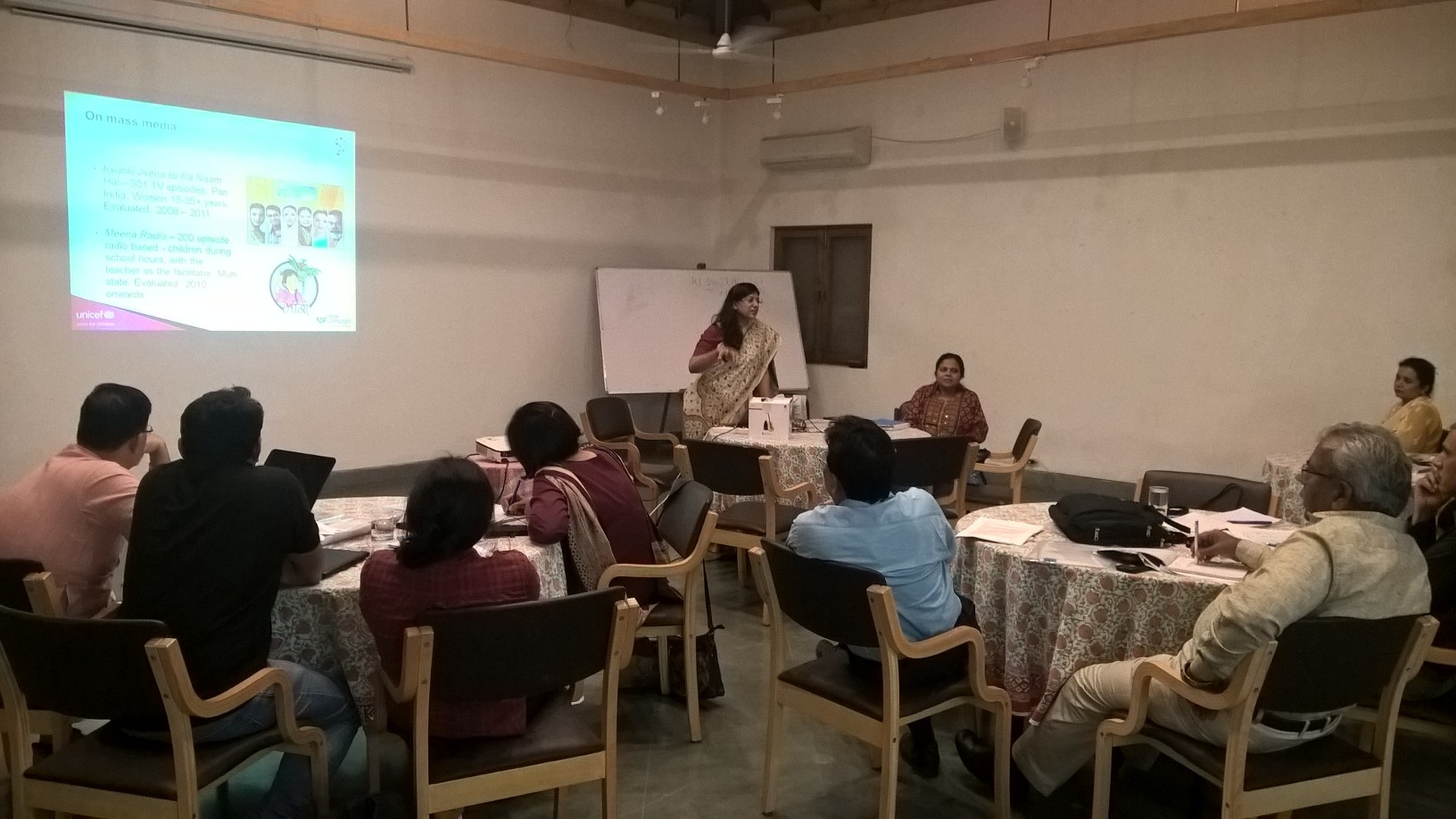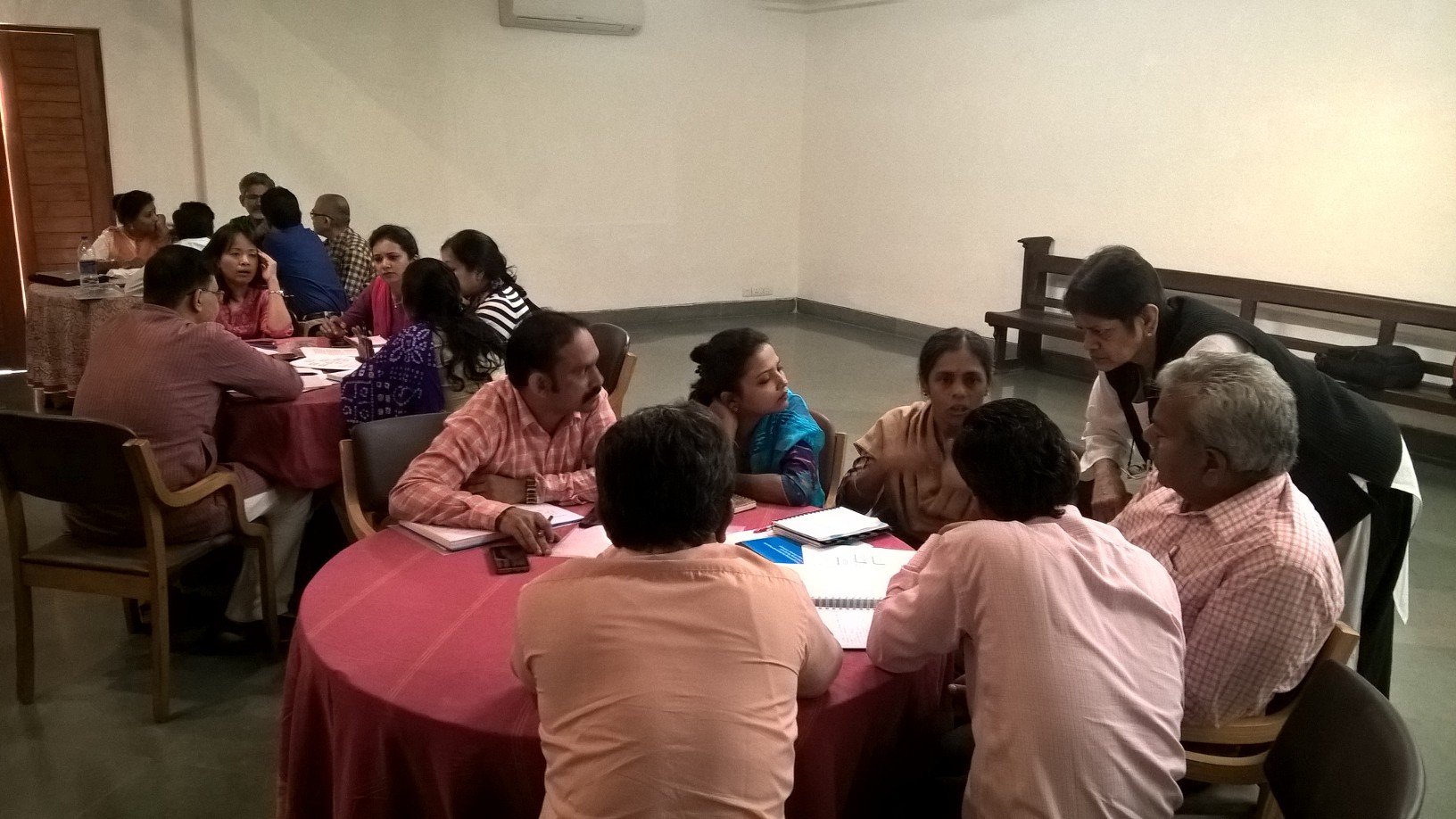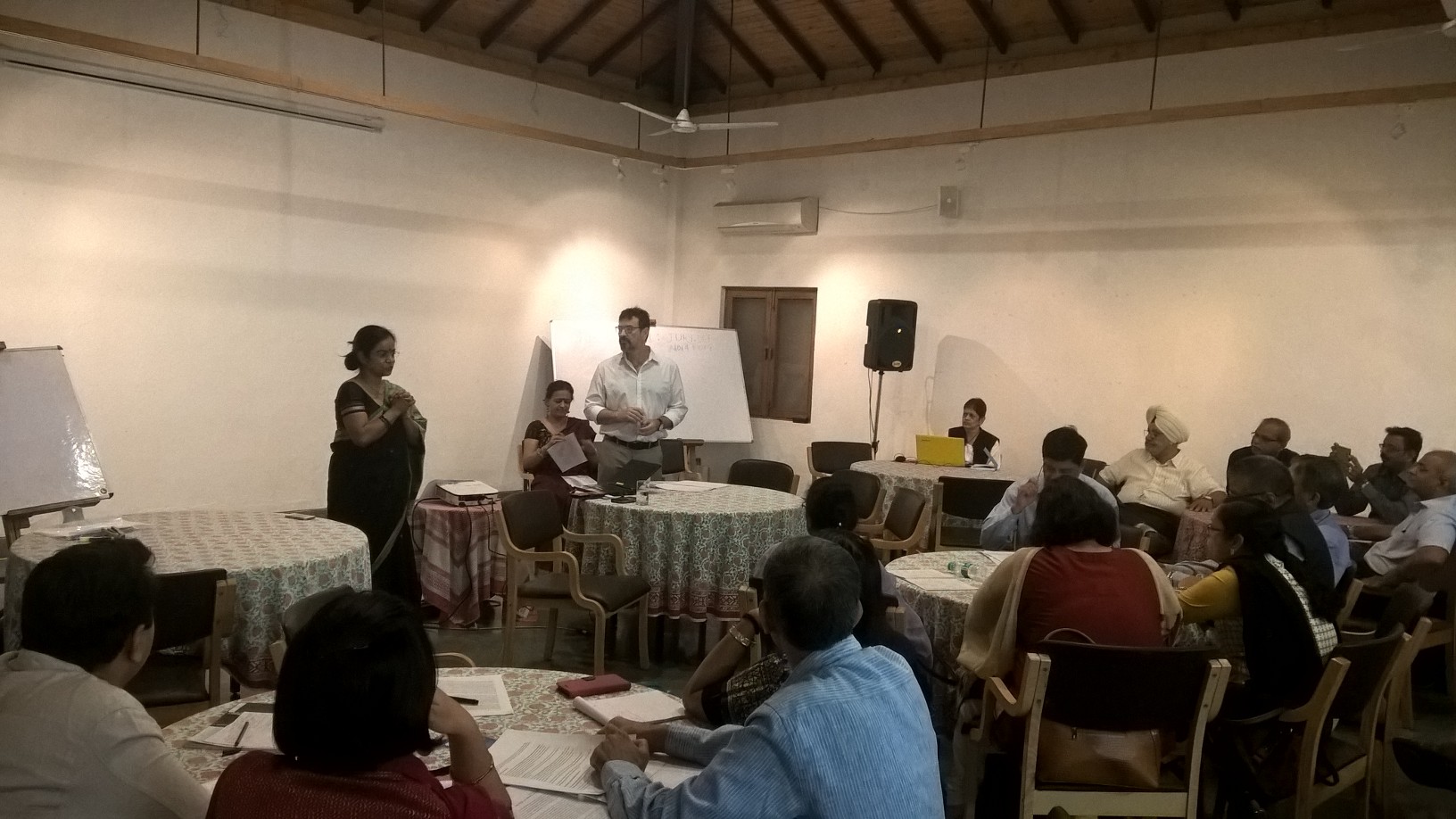News
Orientation of New Concept’s SBCC Lead Trainers on the C4D workshop organised by Ohio University at Hyderabad
2-3 Nov 2016, Hyderabad
UNICEF has partnered with Ohio University for a nine-month blended-learning course on Communication for Development (C4D). The course consists of three online modules focusing on issues such as values and concepts in C4D; social change theory; and monitoring and evaluation (M&E). The online training portion of the course is followed by a face-to-face workshop. The 7th cohort’s face-to-face workshop was held from 31st July to 12th August 2016 in Hyderabad, India in collaboration with University of Hyderabad.
The C4D course was designed to help participants: From New Concept’s pool of SBCC-Tarang Lead Trainers (LTs); Dr. Amar Nidhi and Sudha Nair participated in the C4D Learning Programme in Hyderabad from July 31 – August 12, 2016. In order to transact the key learnings and discussions from the 12-day programme among the SBCC LT team, a 2-day sharing workshop with the SBCC LTs in New Delhi on Nov 2-3, 2016 was held.
From New Concept’s pool of SBCC-Tarang Lead Trainers (LTs); Dr. Amar Nidhi and Sudha Nair participated in the C4D Learning Programme in Hyderabad from July 31 – August 12, 2016. In order to transact the key learnings and discussions from the 12-day programme among the SBCC LT team, a 2-day sharing workshop with the SBCC LTs in New Delhi on Nov 2-3, 2016 was held.
The trainings looked at providing a comprehensive overview of the 12-day C4D workshop in a concise manner – with focus on understand C4D and SBCC in a comprehensive way across different sectors. The group looked at the inter-linkages between the key conceptual frameworks and C4D planning models, and how they could be employed to address both individual level behaviors as well as collective social practices. The sessions covered and linked the importance of a rigorous desk review, formative research (both qualitative and quantitative) and participatory research tools; and how they guide in effectively planning and designing a C4D/SBCC strategy.
Media representations and inclusive communication for child and human rights with a focus on inclusion and equity was also shared. The session emphasized how disability is increasingly being included in communication materials – with focus on their dignity, rights and capabilities.
A key component of the training looked at the Entertainment-Education (EE) approach of UNICEF and the audio-visual tools developed by UNICEF, India. The importance of maintaining a balance between entertainment and education, and using EE for sustained engagement with community groups (like FFL-videos) were also discussed among the group. The last sessions delved into monitoring and evaluation of C4D interventions – with emphasis on the Theory of Change. Focus here was on discussing the inputs, outputs, outcomes and impact and the need for defining communication and behavioural objectives in a communication strategy.
The two-day sharing workshop was followed by a half-day interaction on understanding social and gender norms with lead trainers of New Concept and eNVisions, which was facilitated by the UNICEF ICO C4D team. The facilitators led by Mario Mosquera Vasquez and Alka Malhotra presented social norms as a diagnostic tool and discussed different ways of its application in the Indian context. Various groups presented situations from their trainings and tried to diagnose them under normative/empirical expectations and descriptive/social norms. There was general consensus among all participants that it is important to talk about social norms during training situations.
The C4D course was designed to help participants:
- Understand key theories around communication, development, culture, behavior and social change; human rights principles including inclusion and equity; and C4D concepts, approaches, methods and techniques
- Apply this knowledge to analyze root, structural and direct causes; and generate insights related to behavior and social change components of UNICEF’s work
- Provide guidance in the application of processes and principles of C4D research, design, implementation and management, monitoring and evaluation to UNICEF programming and humanitarian actions
- Guide, manage and facilitate the design and development of effective, small and large scale C4D strategies and interventions for behavior change and social transformation that nurture evidence, and promote the principles of human rights, social inclusion and accountability
- Lead and manage partnerships in this area of work, through harnessing the potential and creativity of counterparts, formal and informal national and community based networks, as well as advocating for mainstreaming of C4D within development programmes, policy advocacy and humanitarian action.
 From New Concept’s pool of SBCC-Tarang Lead Trainers (LTs); Dr. Amar Nidhi and Sudha Nair participated in the C4D Learning Programme in Hyderabad from July 31 – August 12, 2016. In order to transact the key learnings and discussions from the 12-day programme among the SBCC LT team, a 2-day sharing workshop with the SBCC LTs in New Delhi on Nov 2-3, 2016 was held.
From New Concept’s pool of SBCC-Tarang Lead Trainers (LTs); Dr. Amar Nidhi and Sudha Nair participated in the C4D Learning Programme in Hyderabad from July 31 – August 12, 2016. In order to transact the key learnings and discussions from the 12-day programme among the SBCC LT team, a 2-day sharing workshop with the SBCC LTs in New Delhi on Nov 2-3, 2016 was held.
The trainings looked at providing a comprehensive overview of the 12-day C4D workshop in a concise manner – with focus on understand C4D and SBCC in a comprehensive way across different sectors. The group looked at the inter-linkages between the key conceptual frameworks and C4D planning models, and how they could be employed to address both individual level behaviors as well as collective social practices. The sessions covered and linked the importance of a rigorous desk review, formative research (both qualitative and quantitative) and participatory research tools; and how they guide in effectively planning and designing a C4D/SBCC strategy.
Media representations and inclusive communication for child and human rights with a focus on inclusion and equity was also shared. The session emphasized how disability is increasingly being included in communication materials – with focus on their dignity, rights and capabilities.
A key component of the training looked at the Entertainment-Education (EE) approach of UNICEF and the audio-visual tools developed by UNICEF, India. The importance of maintaining a balance between entertainment and education, and using EE for sustained engagement with community groups (like FFL-videos) were also discussed among the group. The last sessions delved into monitoring and evaluation of C4D interventions – with emphasis on the Theory of Change. Focus here was on discussing the inputs, outputs, outcomes and impact and the need for defining communication and behavioural objectives in a communication strategy.
The two-day sharing workshop was followed by a half-day interaction on understanding social and gender norms with lead trainers of New Concept and eNVisions, which was facilitated by the UNICEF ICO C4D team. The facilitators led by Mario Mosquera Vasquez and Alka Malhotra presented social norms as a diagnostic tool and discussed different ways of its application in the Indian context. Various groups presented situations from their trainings and tried to diagnose them under normative/empirical expectations and descriptive/social norms. There was general consensus among all participants that it is important to talk about social norms during training situations.
 |
 |